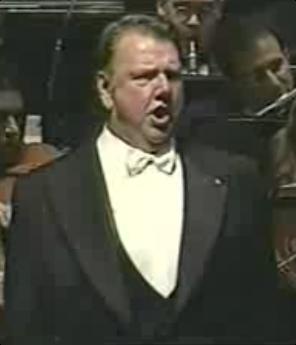Born into a German-Russian family of Mennonite immigrants, Heppner studied voice at the
Universities of British Columbia and of Toronto (with William Neill). While
still studying, he made his debut in 1981 in Vancouver as Roderigo in Otello; 1982–84, he was with the
Canadian Opera Company, singing roles like Ernesto, Camille de Rosillon, Alfred in Fledermaus, Hoffmann or Rodolfo.
William Neill prepared him for a more dramatic repertory; he made the transition in 1987, singing Bacchus in Australia. In
1988, he was Walther von der Vogelweide in Chicago (US debut), and in 1989, he was on a European stage for the first time
(Lohengrin in Stockholm), as well as in Philadelphia and Seattle (Stolzing, in both cases) and at Carnegie Hall. In 1990,
his Vienna Staatsoper debut followed (as Bacchus, he was to return several times until 2007). In 1991, he made an
anticipated Met debut, stepping in for Luciano Pavarotti as Idomeneo (he was scheduled to sing Riccardo later the same
season), which led to a close and long association with the Met (until 2009).
Now the whole operatic world was open to Heppner: La Scala, Covent Garden, Munich, Frankfurt, Hamburg, Cologne,
Théâtre de la Monnaie, Marseille, Geneva, Buenos Aires (Colón), Paris Opéra, Maggio Musicale
Fiorentino... He sang now mostly heldentenor parts: Tristan, Stolzing, Erik, Florestan, Peter Grimes, Andrea
Chénier, Canio, Énée, Prince in Dvořák's Rusalka, and for about ten years, he was
interesting because he was a heldentenor with a top. Things started to go south when he sang his first Otello in 2001 in
Chicago; the role overstrained him, and he had to cancel many scheduled performances. In the 2000s, his top was generally
no longer what it used to be, and at the end of the decade, he retired.
Reference: The Canadian Encyclopedia
